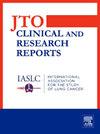Brief Report: Prospective Trial of Pembrolizumab Monotherapy in Metastatic NSCLC Evaluating Circulating Tumor DNA as a Surrogate Biomarker of Response
IF 3.5
Q2 ONCOLOGY
引用次数: 0
Abstract
Immune checkpoint inhibitors provide clinical benefit to a subset of patients with metastatic NSCLC, yet the reliable prediction of long-term outcomes remains challenging. We conducted a prospective phase 2 clinical trial to evaluate circulating tumor DNA (ctDNA) as a surrogate biomarker for early clinical response to pembrolizumab monotherapy (NCT02955758). Tumor-informed targeted sequencing of pretreatment and early on-treatment plasma ctDNA in 25 patients with metastatic NSCLC was performed. On-treatment ctDNA response, defined as at least a threefold ctDNA variant allele frequency decrease after three cycles of pembrolizumab versus baseline, was able to predict with 100%, 66%, and 100% accuracy partial response, stable disease, and progressive disease radiologic response, respectively. Molecular response was also correlated with progression-free survival. This study confirms the potential clinical utility of early on-treatment ctDNA-based response evaluation in patients treated with immune checkpoint inhibitors, creating the opportunity for early treatment intervention in nonresponders.
简要报告:Pembrolizumab单药治疗转移性NSCLC的前瞻性试验评估循环肿瘤DNA作为替代生物标志物的反应
免疫检查点抑制剂为一部分转移性非小细胞肺癌患者提供了临床益处,但对长期预后的可靠预测仍然具有挑战性。我们进行了一项前瞻性2期临床试验,以评估循环肿瘤DNA (ctDNA)作为派姆单抗单药治疗(NCT02955758)早期临床反应的替代生物标志物。对25例转移性非小细胞肺癌患者的治疗前和治疗早期血浆ctDNA进行了肿瘤知情的靶向测序。治疗中的ctDNA反应,定义为在三个周期的派姆单抗治疗后,与基线相比,至少有三倍的ctDNA变异等位基因频率下降,能够分别以100%,66%和100%的准确度预测部分反应,稳定疾病和进展性疾病放射反应。分子反应也与无进展生存期相关。这项研究证实了在免疫检查点抑制剂治疗的患者中,基于ctdna的早期治疗应答评估的潜在临床效用,为无应答者的早期治疗干预创造了机会。
本文章由计算机程序翻译,如有差异,请以英文原文为准。
求助全文
约1分钟内获得全文
求助全文
来源期刊

JTO Clinical and Research Reports
Medicine-Oncology
CiteScore
4.20
自引率
0.00%
发文量
145
审稿时长
19 weeks
 求助内容:
求助内容: 应助结果提醒方式:
应助结果提醒方式:


